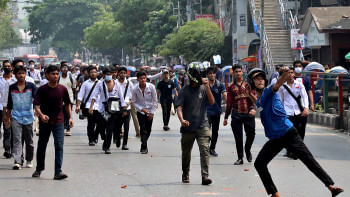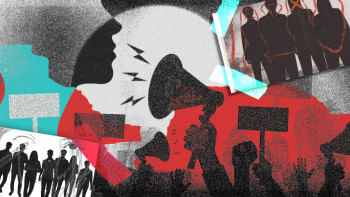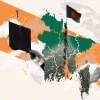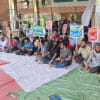The crisis of a fossilised education system

I found it adorable when a visiting envoy fondly recalled that the Dhaka University campus reminded him of his home institution in the 1960s. There was another diplomat who mentioned to me that they were striving to preserve their old buildings, which resembled our administrative building, as heritage sites. A pattern of irony emerged. It is no coincidence that people think we are frozen in time.
Then there was this Facebook post of a recent graduate recounting his valid concerns of not getting an equivalence certificate in time to complement his application for higher studies abroad. The DU registrar's office, he claimed, was taking an eternity to send an email. What use is a certificate if it remains unendorsed when necessary? A section of the press picked up the news and published an opinion piece, spotlighting the required reforms. The writer shared his experience of missing two scholarship opportunities in the 90s due to DU's failure to mail the official transcripts.
Indeed, we seem to be stuck in the past. And it is no wonder that newer universities with a greater appetite to grow are outpacing us in ranking.
As a DU insider, I cannot shy away from my responsibilities. The frustrating pace at which things move at this university is as confusing as our traffic signal. The rule is there is no rule, yet there is an abundance of it. To quote one of our Chinese friends about our traffic system, "You guys are so civilised that you don't need the traffic light. Meanwhile, we must maintain constant discipline." Why do we always have to be at the butt end of the joke? I use the perspectives of our foreign friends to show how reality is often different from the situation we have become comfortably attached to.
The other day, an ongoing protest by the polytechnic institute's students delayed a delegation. What's wrong with these students? Why do they seek to have their diplomas recognised as equivalent to a fully fledged engineering degree? Perhaps it's time to move past our initial reaction of "how dare they" and try to understand their concerns. The students from polytechnic institutes are not only demanding recognition as engineers, but also a comprehensive overhaul of technical education. They are seeking a technical university of their own, revision of their outdated curricula, removal of controversial appointments, and formation of a dedicated ministry for technical and vocational education.
Deja vu. The seven colleges affiliated with Dhaka University staged a similar protest and managed to get a promise of a university of their own. At the heart of both protests lies the issue of dignity and progression. Even after pursuing a four-year programme, diploma graduates face stunted career growth and exclusion from higher education opportunities. It is the same time required for an engineering degree.
Unlike their peers in public or private universities, polytechnic students often come from rural or lower-middle-class backgrounds. Denying the legitimacy of their demands due to age-old prejudice would be unfortunate. In a country starved of mid-level technicians and vocational experts, this systemic neglect of technical graduates is paradoxical and shortsighted. The equivalence of their degree should be on par with global practices. Students should have the right to know the outcome of a degree before joining a programme. Encouraging students to fight for their rights once they are in the system is a sign of poor educational policy. We pay policymakers to ensure the economic mobility of our graduates. The anti-discriminatory spirit with which the July uprising brewed is at odds with the inequality that persists and the way human capital is squandered, especially when Bangladesh should be harvesting its demographic dividend.
The much-talked-about youth bulge, with over 47 percent of the population under the age of 25 years, will not yield any automatic result unless there are strategic policies to create a healthy, educated, and skilled workforce. Our students don't view their education as transformational. The view that education is just a degree affirms its transactional nature. The repeated demands for reforms highlight an institutional limbo in which our young generation is trapped.
Polytechnic graduates are recruited in government services with little scope for career progression, demonstrating an old mindset that wants to keep disparity intact. The same mindset favours placing faculty members at the bottom of the hierarchy. The inter-service friction within the government has exposed the tension. In the absence of incentives and in-service professional development, teachers and staff often remain underqualified and disengaged.
It will be a crime to miss the post-uprising zeitgeist and not to overhaul our educational sector. The interim government's failure to form an education reform commission is a mystery. Educational rupture often provides an opportunity to shake up the frozen system. Iran formed the Supreme Council of Cultural Revolution after the 1979 revolution; South Africa created the National Commission on Higher Education in 1995 in the post-apartheid era; Rwanda prioritised overhauling its technical and vocational education and training (TVET) systems following the 1994 genocide. The interim government's handling of the educational stalemate will prove very costly.
Education is more than skills or jobs; it is about belonging, dignity, and the capacity to shape the future. But our systems, especially the public ones, remain fossilised. Our public system continues to ignore the aspirations of its youth. The controlled protests may alienate our youth. History reveals that alienation can transform into apathy or unrest, which can swiftly escalate beyond control. The state must choose. It can allow the public universities to be a site of nostalgia and reminiscence about previous glory. Or it can take bold action: go beyond simply managing the crisis and transform the system. The cost of inaction will be paid not just in student frustration, but in lost generations. And foreign friends will come and visit us with dreamy nostalgia.
Dr Shamsad Mortuza is professor of English at Dhaka University.
Views expressed in this article are the author's own.
Follow The Daily Star Opinion on Facebook for the latest opinions, commentaries and analyses by experts and professionals. To contribute your article or letter to The Daily Star Opinion, see our guidelines for submission.

 For all latest news, follow The Daily Star's Google News channel.
For all latest news, follow The Daily Star's Google News channel. 










Comments